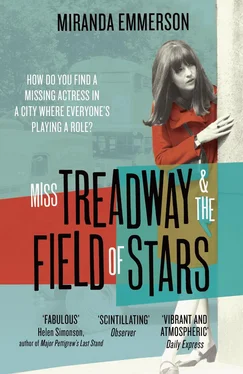Of course, everyone expected Lanny to arrive by the interval. She must have gone off for the day and got stuck in traffic. That’s what made most sense. But the interval came and went and there was no Iolanthe.
Leonard phoned round the hospitals in case there had been an accident. He phoned The Savoy again and spoke to the desk clerk. Iolanthe hadn’t been in her room since Friday night.
The show came down at ten to ten. The audience cheered Agatha, though many had left at the interval since catching sight of Iolanthe Green had been their main reason for buying the tickets. Leonard called a meeting on the stage. The cast sat on chairs in a circle. Anna sat with the other dressers and the crew on the floor. Leonard told everyone about his call to The Savoy.
‘Iolanthe has to be considered a missing person. I’ve already called the police. If she hasn’t turned up by tomorrow morning they’ll be coming down to interview us here. The show will keep running but management are going to keep an eye on cancellations. If we’re not playing to at least forty per cent attendance they may take us off in another week. Don’t worry about that now, but I need to give you that warning so you’re prepared. No one of Iolanthe’s description has been admitted to any of the big hospitals. I’m going to see that as a good thing. You all did well tonight. Go home. Get some sleep. Company meeting at four tomorrow followed by a line run if it’s understudies again. Okay. Off you go!’
***
On Tuesday the papers were full of Iolanthe’s disappearance. The Mirror asked if Brady and Hindley had inspired a copycat murder in London. The Sun wanted to know if Iolanthe had fallen prey to a gang of Soho people smugglers. The Daily Express asked its readers to join police in hunting for the glamorous starlet. The Daily Telegraph wondered if fragile, unmarried Miss Green had run away from the pressures of fame.
On Wednesday afternoon, as the company of understudies gathered for yet another line run, BBC Radio News arrived to interview Leonard about Lanny’s disappearance. Anna stood in the green room beside the transistor radio and listened to Leonard intoning his worries and incomprehension at six o’clock and then again at ten. Each time she heard someone familiar speak, or read someone she knew quoted in the paper, they – the people involved, the events – became less familiar. She was starting to see it as a story herself. The story of how Lanny disappeared.
On Thursday The Times wanted to know why women weren’t safe to walk the streets of Theatreland and the Guardian wanted to know why so much attention was being paid to one wealthy actress when in the past week alone two hundred ordinary people had gone missing without any great fanfare at all.
On Friday, as Londoners gathered to burn effigies of Guy Fawkes, police were called to a disturbance at a flat in Golden Square. When they arrived they found a young male prostitute called Vincent Mar lying on the front steps having sustained a terrible head wound. The police arrested a middle-aged man who was the tenant of the flat they’d been called to attend. The man’s name was Richard Wallis and he happened to be a Junior Minister of State for Justice in Her Majesty’s Government. By the time Wallis had been released – without charge – late on Saturday night, the papers had got hold of the scandal and Iolanthe was about to be knocked quite definitively off the front pages.
Monday, 8 November
In West End Central police station, up on Savile Row, Inspector Knight had been co-ordinating a well-resourced search effort for Iolanthe but now he was running out of ideas. Statements had been taken and double-checked, posters had been mounted in prime locations, hospitals had been phoned and visited. Nobody, it seemed, absolutely nobody, had seen Miss Green.
Over the course of a fraught weekend, in which he had seen nothing of his wife or children, Knight had been instructed firmly by the Home Office that he was to scour Soho for other possible assailants of young Mr Mar who had – to the relief of many – failed to regain consciousness after the attack. But the majority of Knight’s men were assigned to the hunt for the missing actress.
The Sunday papers had attempted to try and convict Mr Wallis right there on the newsstands and pressure from the offices of government was increasing. So at 9 a.m. on Monday, Inspector Knight called into his office a detective sergeant by the name of Barnaby Hayes.
‘The government is defecating in its collective knickers, Hayes.’
‘I’m sure it is, sir.’
‘I have until next Sunday to find at least one fully fashioned scumbag who might have tried to kill, rob or bugger Vincent Mar. I also have to hope the bloody man’s about to die, because if he wakes up and recounts a night of ecstasy with Mr Wallis we’re all fucked.’
‘Sir.’
‘The worst of it is I still have to pretend to care about Iolanthe Green when any fool can see that the woman’s obviously done herself in and hasn’t had the decency to leave her body somewhere handy.’
‘Yes, sir.’
‘You’re the closest thing I have to competent in my department, Hayes. Don’t fuck up and don’t talk to any press.’
‘Sir.’
‘Find the body. Close the case. We have better things to be doing.’
Barnaby Hayes picked up the small pile of manila files and carried them out of the office to his desk. He was a meticulous and careful officer, a player by the rules. He had distinguished himself in the eyes of Knight by working long hours and never once trying to cut corners or claim he’d done work when he hadn’t. His name – as it happened – was not Barnaby at all, but Brennan. He had cast this particular mark of Irishness away from him when he joined CID.
He opened the files and rearranged their contents. He knew from bitter experience that not everyone in the department was as assiduous as he was and he could see no other way ahead but to start from scratch and re-interview everyone connected to Iolanthe. He cast his eyes down the list of eyewitnesses from the Saturday she had disappeared. The name at the top of the list was Anna Treadway. He dialled her number.
Anna Treadway lived on Neal Street in a tiny two-bed flat above a Turkish cafe. She went to bed each night smelling cumin, lamb and lemons, listening to the jazz refrain from Ottmar’s radio below. She woke to the rumble and cry of the market men surging below her window and to the sharp, pungent smell of vegetables beginning to decay.
At seven o’clock most mornings of the week she would make the walk to buy a small bag of fruit for her breakfast. Past the Punjab India restaurant, where the smell of flatbread was just starting to escape the ovens. Past the vegetable warehouses with their arching, pale stone frontages. Past the emerald green face of Ellen Keeley the barrow maker. Past the dirty oxblood tiles of the tube station where Neal Street ended and James Street began. Past Floral Street where the market boys drank away their wages and down, down, down to the Garden. Covent Garden: once the convent garden. Now so full of sin and earth and humanity. Still a garden really, after all these years.
The roads around it were virtually impassable most mornings, a deadly tangle of horses, dogs, cars and old men whose thick woollen cardigans padded out their frames until they looked like overstuffed rag dolls with pale, needle-pricked faces. Men who pulled great barrows – like floats from a medieval carnival – piled with sweetcorn and plums, leeks and potatoes and fat red cabbages that gleamed and glistened like blood-coloured gems. Men who balanced on their heads thirty crates of lavender that swayed and bowed as they walked and left the perfume trail of distant fields everywhere they went. Covent Garden, so sensual and unkempt: a temple to something, though no one could tell you quite what. Money. Nature. London. Anna sometimes thought that it acted like a city gate, announcing London’s size and grandiosity to all who visited there. Look at us, it said, look what it takes to feed us all. How mighty we must be when roused. How indomitable.
Читать дальше












